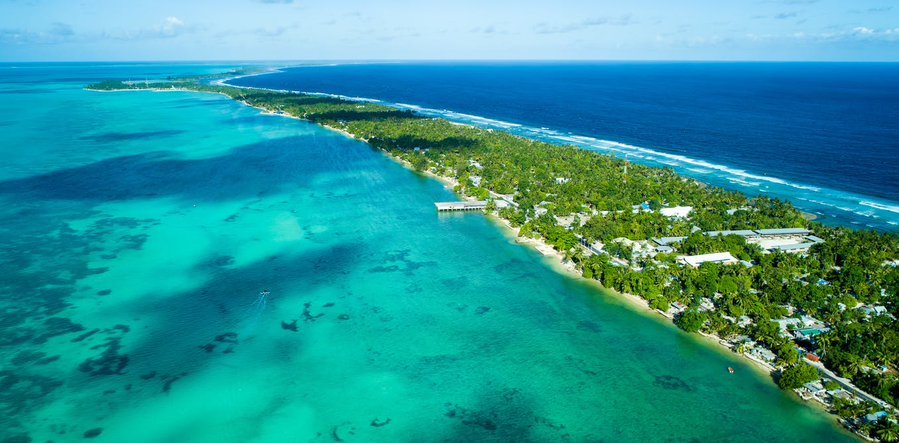
Expression
Australian news crew detained
A five-member film crew from 60 Minutes Australia was detained in Kiribati in October 2019 for what government sources claimed was a false declaration by the team on arrival.
The crew was detained shortly after they arrived on a flight on 28th October 2019 from Nadi for allegedly providing “false and misleading information” over the purpose of their visit. The crew led by 60 Minutes reporter Liam Bartlett were held under house arrest at the Utirerei hotel until the next flight out. Immigration officials had been stationed outside the hotel room to prevent the crew from leaving.
However, Channel Nine news disputed this version of events, saying that before leaving for Kiribati the crew had submitted applications for filming approval. On arrival they arranged a meeting with authorities including the Executive Assistant of the President and a Senior Representative of the Immigration Department to discuss the application. Further forms were submitted, and a request was made for expedited approval.
The crew were reportedly intending to cover the recent decision of the Kiribati government to sever diplomatic ties with Taiwan and establish diplomatic relations with China. Some believe this move had led to increased restrictions on foreign media in the island nation.
The media rights watchdog the Pacific Freedom Forum (PFF) chair Bernadette Carreon, of Palau said;
“At this stage, the events probably signal a need for Kiribati to provide better media access rules and clear up perceptions the paperwork involved is aimed at keeping journalists out.”
This is not the first time foreign media has been restricted in the country. A crew from the New Zealand outlet Newshub were detained in 2018 when they arrived in Kiribati to report on the ferry disaster that killed 95 people. The Australian Broadcasting Corporation has also been denied access to cover the tragedy. According to RNZ Pacific, the government tightened its criteria for media permits since the disaster.
Association
Landmark case for people displaced by climate change
For the first time, a landmark legal ruling has stated that refugees should not be forced to return home if their country is severely affected by climate change. https://t.co/CGa66SUzyo
— Australia for UNHCR (@UNrefugees) January 28, 2020
In January 2020, in a ground-breaking asylum case, a UN human rights body ruled that governments must take into account the human rights violations caused by the climate crisis when considering deportation of asylum seekers.
Ioane Teitiota of Kiribati, brought a case against the government of New Zealand at the UN Human Rights Committee (HRC) in February 2016 after authorities denied his claim of asylum as a ‘climate refugee.’ He was deported from New Zealand to Kiribati in September 2015.
Teitiota says he faced land disputes and difficulties accessing safe drinking water in his home country as a result of the climate crisis, and therefore was forced to migrate with his family to New Zealand where he applied for refugee status after his visa expired in 2010.
He was denied asylum by New Zealand’s Immigration and Protection Tribunal, the Court of Appeal and the Supreme Court. He then took his case to the HRC on the grounds that New Zealand violated his right to life under the International Covenant on Civil and Political Rights by deporting him to Kiribati.
Kate Schuetze, Amnesty International Pacific Researcher said:
“The decision sets a global precedent. It says a state will be in breach of its human rights obligations if it returns someone to a country where – due to the climate crisis – their life is at risk, or in danger of cruel, inhuman or degrading treatment.”
While the Committee found that Teitiota’s deportation had not been unlawful because he didn’t face an immediate danger to his life in Kiribati, it recognised that climate change represented a serious threat to the right to life and therefore decision-makers need to take this into account when examining challenges to deportation.
Kiribati NGO highlights challenges faced by the LGBT community
Ahead of the Universal Periodic Review of Kiribati at the UN Human Rights Council, Boutokaan Inaomataia ao Mauriia Binabinaine Association (BIMBA), a civil society organisation (CSO) with an emphasis on working with SOGIESC-related challenges and issues in Kiribati, made a submission to the Council. The submission focused on the challenges and constraints faced by members of the lesbian, gay, bisexual and transgender (LGBT) community in Kiribati.
Among the recommendations in the report was for the introduction of legislation on equality and non-discrimination to protect the rights of people with diverse SOGIESC from stigma, discrimination and prejudice, which are poorly documented or reported. The group also asked the government to decriminalise homosexuality and sign the joint declaration of the United Nations General Assembly of 18th December 2008 regarding human rights, sexual orientation and gender identity.
According to BIMBA, in the Penal Code of Kiribati, homosexuality is currently criminalised.The laws related to this include ‘buggery’ in Section 153 with a penalty of 14 years, ‘attempted buggery’ in Section 154 with a penalty of seven years and ‘gross indecency’ in Section 155 with a penalty of five years.